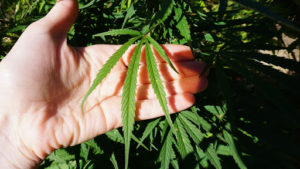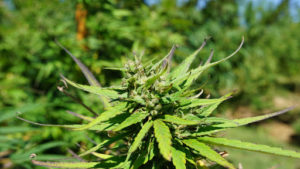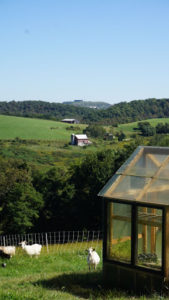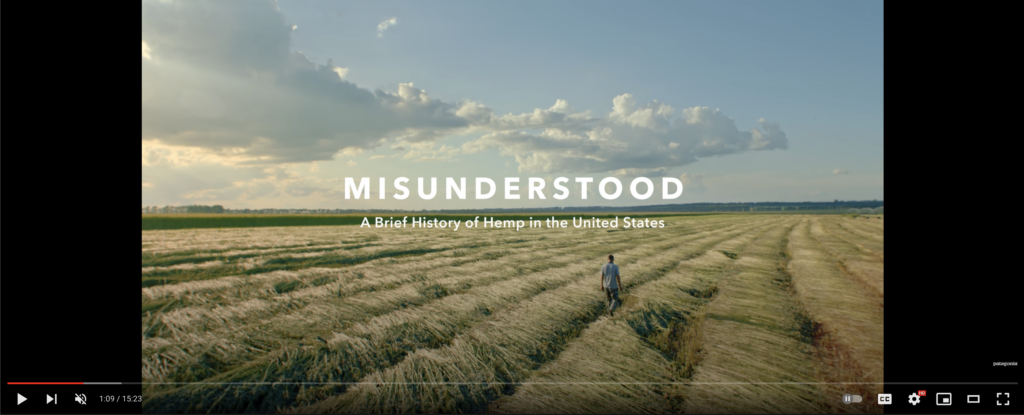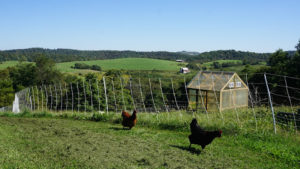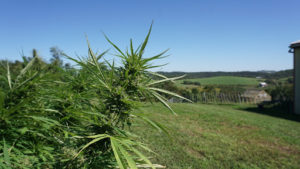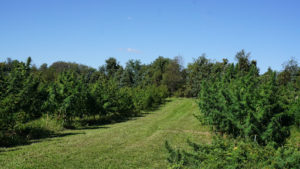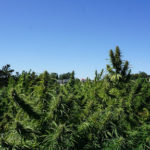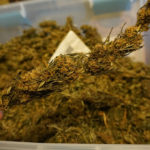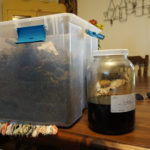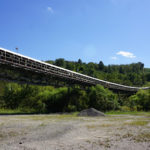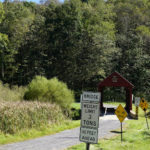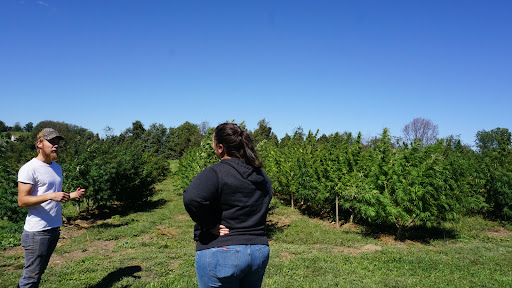
In late September, a few CCJ staff members took a field trip to Burnsville Hemp Company in West Finley in Washington County, with Greene County and the Bailey Mine CRDA just a stone’s throw away (see the photo above). As we drove through the winding roads to the farm, I was amazed how much of this region I have still not discovered despite having lived here my entire life. We pulled up to an unassuming farmhouse and were greeted by two friendly dogs and Nicholas and Amber Martin. Nicholas had grown up in the area and had always dreamed of farming and contributing to his community. After seeing how CBD helped his own quality of life, he started the CBD hemp farm in 2020 in order to bring it to others in this community at high quality and a low price.
So what is the difference between what is known as “marijuana” and “hemp”? The terms can be confusing, so it is important to define them. Technically, the species of plant is “cannabis”.
Cannabis originally hails from East Asia and has been cultivated by humans for millennia. Typically, marijuana refers to the female flower bud which contains THC, which is classified as an illegal drug in the U.S. Hemp typically refers to the fiber of the plant which can be used to make everything from clothing to paper. Hemp can also be grown for its flower buds containing CBD, which is a legal compound used for medicinal purposes. While CBD and THC are both mood-altering “psychoactive” compounds, CBD does not create the “high” that THC creates. Think of the different types of cannabis as sisters with different purposes. I will be using the terms “hemp” and “cannabis” interchangeably. The hemp on the Burnsville Hemp Company farm is solely grown for CBD. It was actually only made legal to grow hemp in this way in the 2018 Farm Bill, which allowed “industrial hemp” to be grown and defined it as containing no more than 0.3% THC by dry weight. You can learn more about hemp’s history and uses in the video below.
Cannabis in the United States has had a long and complicated history. When America was first colonized, hemp was regarded as a very valuable commodity for rope, sails, and clothing. In 1619, Virginia passed a law requiring hemp to be grown on every farm in the colony. While hemp may have been used medicinally at this time, it wasn’t a popular medicine until the 19th century. By the late 1800s, using hashish (concentrated cannabis resin) had become popular in Europe and the US and cannabis became a popular ingredient in tinctures sold at pharmacies. In the early 1900s, cannabis became associated with Mexican immigrants entering the US after fleeing the violence of the Mexican Revolution in 1910, and the Spanish word for cannabis – marijuana – became popular.
The roots of criminalization of cannabis were already sown by the time cannabis use became associated with black and brown immigrants and a counterculture movement in the US. According to the History Channel, “In the 1930s, Prohibition was repealed in the middle of the Great Depression. Straight-laced bureaucrats looking for another target turned their attention to marijuana, which, at the time, was mostly being used in the Mexican and black communities. They painted the drug—and the communities using it—as a threat to the already crippled country and began the process of banning it. Twenty-nine states had outlawed marijuana by 1931, and in 1937, the Marijuana Tax Act was passed, essentially making the plant illegal in the United States.” With over 40,000 people, who are disproportionately black and brown, locked up in the US in 2020 for marijuana offenses, it is impossible to talk about even the legal cannabis industry without acknowledging the racialized history of this plant.
As mentioned above, cannabis has an incredible amount of uses besides being grown for THC. The CBD bud that the Martin family grows can be sold in its original dried form or it can be turned into an oil called “crude oil”. The cannabis grown for fiber is grown differently than how the Martins grow it. While Nicholas cultivates bushy plants to create as many buds as possible, fiber hemp is encouraged to grow tall and straight to create long fibers. Hemp is an incredible natural fiber, being durable, breathable, and less prone to stretching than cotton fibers. With cotton requiring a warm climate and huge amounts of irrigation and pesticides, hemp is a fiber that can be grown in many climates and requires very few inputs. It is called “weed” for a reason. Everything from paper to fuel to construction materials can benefit from hemp fiber. Hemp can even be turned into a fossil-fuel free “bioplastic”. Additionally, it can be a food source for both humans and livestock, with hemp seeds being rich in protein, fiber, and fatty acids including the much-acclaimed omega-3s and omega-6s.
This all translates to our region because it is a crop that is relatively easy to grow and brings a high return on investment, which can help farmers both thrive and restore the land. Hemp can even be used to restore old industrial sites like strip-mined land because it has a handy knack for absorbing toxins. The hemp would, however, have to be disposed of properly. Its other knack is for “building” and restoring healthy soil with little to no fertilizer and pesticide input which is essential for healthy farms, and it sequesters carbon! Lastly, in a region still struggling through the opioid crisis, CBD has been shown to offer some help to those struggling with addiction.
The CBD hemp industry is both highly regulated but also not. The Martins’ crop must be tested for THC to be below the 0.03% legal limit before they harvest. If it is even 0.01% over, they lose their entire crop for the year. Nicholas also said that to get a permit to enter the lucrative medical marijuana industry in PA, it requires such huge amounts of capital that it is virtually impossible for “mom and pop” growers. While the Martins’ products are third-party lab tested for quality, because it is not regulated by the FDA as a “medicine”, you may see various CBD products in anywhere from gas stations to grocery stores and may not be getting what some are claiming on the label.
After our visit to the Martins’ farm, the family had their farm’s second CBD hemp harvest. We encourage you to check out their website and products here. The thing that struck me the most from our farm tour was how local his entire operation is. He is currently the only CBD hemp grower in the area. Someone in Washington, PA is able to extract the oils from his harvested buds using CO2 extraction (which requires machinery too expensive for Nicholas to currently own himself). Then he and Amber create their products and they are able to sell them locally at farmers’ markets and on their website. His goal is to avoid overhead costs and sell as directly to consumers as possible to create the most affordable product – typical western PA frugality and ingeniousness! As Nicholas says, “Our entire business model is structured to allow us to focus on producing quality products while still keeping our costs and overhead as low as possible.” While it may require more work on their end to do so much themselves, you can see the commitment and passion of the Martins to provide a product that is affordable and helpful to our community.
While there are many benefits that the cannabis industry could bring to this region, we also know better than anyone the risks of a single industry offering nothing but rainbows and butterflies. No industry will “save” this region. We don’t need to be saved. We just need the resources and power to build a strong and healthy community and economy. That starts with all of us committing to serving and investing in our community. This is an industry that can not only restore the land but can be one industry of many to help regenerate our local economy. Industries that don’t extract from our land and people but rather regenerate and heal them is the key to a brighter future for our region.
P.S.: CBD products make great gifts this holiday season! 🙂

